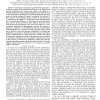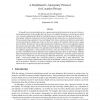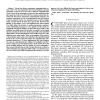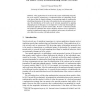167 search results - page 23 / 34 » A Game-Theoretic Approach to Anonymous Networking |
GLOBECOM
2009
IEEE
14 years 2 months ago
2009
IEEE
— In this paper, we propose a game theoretic approach to tackle the problem of the distributed formation of the hierarchical network architecture that connects the nodes in the u...
PERCOM
2009
ACM
14 years 2 months ago
2009
ACM
To benefit from a location-based service, a person must reveal her location to the service. However, knowing the person’s location might allow the service to re-identify the pe...
TON
2012
11 years 10 months ago
2012
Abstract—Various low-latency anonymous communication systems such as Tor and Anonymizer have been designed to provide anonymity service for users. In order to hide the communicat...
PAKDD
2009
ACM
14 years 2 months ago
2009
ACM
Many applications of social networks require relationship anonymity due to the sensitive, stigmatizing, or confidential nature of relationship. Recent work showed that the simple ...
ICC
2007
IEEE
14 years 1 months ago
2007
IEEE
— For cognitive radio networks, a popular approach to dynamic spectrum allocation (DSA) is game theoretic, which improves spectrum efficiency in a distributed manner. In a doubl...




